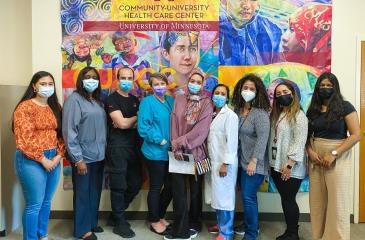Located in the heart of the Phillips neighborhood, Community-University Health Care Center (CUHCC) provides comprehensive team-based care to almost 12,000 patients annually from diverse countries, cultures, and backgrounds. For more than 50 years, CUHCC has bridged global and urban medicine to meet the needs of diverse communities, including new immigrants and refugees.
Over the past year and a half, CUHCC has played a key role in a University of Minnesota multi-agency partnership with the Minnesota Departments of Health and Human Services and the Mobile Health Initiative. This partnership acted as an emergency response team that provided mobilized health care and coordinated screenings to newly arrived Afghan refugees. Between 2021 and 2022, they served over 1,200 displaced Afghans.
In fall 2021, CUHCC’s clinic received 334 referrals to their dental, primary care, pediatrics, obstetrics and gynecology, behavioral health, and social support departments from the original screening endeavor. As the Minnesota Department of Health’s need grew, CUHCC stepped up and implemented a refugee screening workgroup, and added patient navigators and an Afghan interpreter to their team. In March 2022, CUHCC started conducting health screenings of their own while maintaining primary care appointments, and have seen over 1,400 visits from the Afghan community since.
“This work could not have been achieved without the support of CUHCC clinic staff. The number of people who worked to make this run smoothly was astonishing. From coordinating patient rides to the clinic, helping find housing, pharmacy and community resources, setting up rides or finding transportation when patients did not have any means to come to the clinic, coming in on a Saturday to fill pediatric cavities, or having a female security member escort women patients to make them feel safe – so many people played a part in this,” said CUHCC CEO Roli Dwivedi, MD. “This work also could not have happened without the ongoing support from the Minnesota Departments of Health and Human Services. This work contributed to the ongoing efforts to increase collaboration across health systems, and offered insight into what can be achieved when collaboration occurs.”
Coordination and deployment was made possible with leaders in refugee and migrant care and Afghan American health providers and community leaders. This included evaluations for any immediate needs and social support services using trauma-informed care best practices.
“I have enjoyed welcoming this community, learning their culture, assessing their medical, psychosocial challenges, and coordinating primary care appointments at CUHCC, where many have established care and are completing their comprehensive refugee screening. I am proud to witness many new arrivals come full circle, from living in the temporary housing site to working as interpreters, case managers, and volunteering their time to helping other newcomers,” said Opeyemi Adesida, MBBS, MPH, mobile health director.
There were multiple times during the response that families and individuals communicated through their interpreters, case managers, care coordination team, or directly with medical volunteers how appreciative they were of the response and the quick access to care.
"The clinic tries very hard to figure out what is needed in every culture.” - CUHCC patient
"It’s nice to see many Afghans. I don't feel so alone, the clinic makes me feel welcomed.” – CUHCC patient
"I am treated like a human.”- CUHCC patient
Mental health was the primary follow-up concern by the CUHCC medical team and one of the notable health trends in the population. CUHCC staff saw a large number of recurring patients suffering from chronic back pain with no physical ailments. The diagnosis was wide-scale mental and emotional trauma as a result of the events these people had experienced.
Many female new arrivals appreciated having the Women's Clinic staffed by all-female providers and interpreters at the temporary housing site where they could share their health challenges freely.
“Meeting the refugees, hearing their stories, and learning where they came from was such an honor,” said Lan Luu, MD, MPH, co-medical director at CUHCC.



